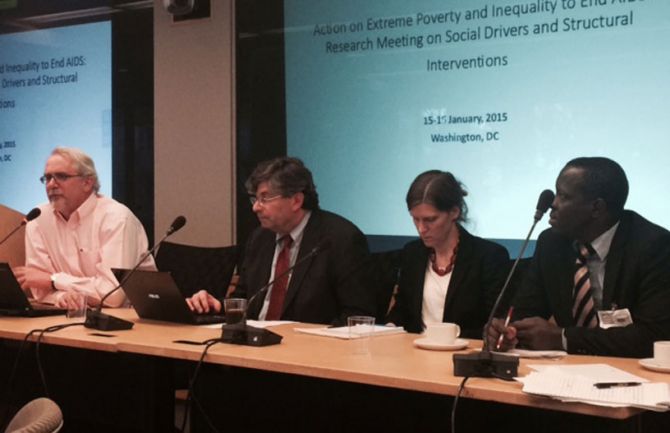

Debrief
Eliminating poverty and inequality and ending the AIDS epidemic
03 February 2015
03 February 2015 03 February 2015Leading academics, policy-makers and HIV and social protection experts met at the World Bank offices in Washington, DC, from 15 to 16 January to identify gaps in research and resources for ending poverty, inequality and the AIDS epidemic by 2030.
The meeting was convened by UNICEF, the World Bank, UNAIDS and Housing Works to find ways to eliminate existing social and structural barriers to accessing HIV services. The meeting brought together people working to end poverty and inequality and people working in the response to AIDS.
The participants highlighted that social protection programmes, including cash transfers in sub-Saharan Africa and parts of the Asia–Pacific region, emerged to mitigate the impact that HIV had among orphans and other vulnerable children and households affected by HIV. Such programmes focused on the vulnerabilities associated with HIV, including poverty, inequality and exclusion. Scaling up social protection programmes was recognized as essential for ending the AIDS epidemic by 2030.
Key messages
- The participants called for the scale-up and expansion of national social protection programmes focused on mitigating the vulnerabilities associated with HIV, including poverty, inequality and exclusion.
- Stronger social protection and HIV research is needed, utilizing impact evaluation approaches that capture the complexity and multisectorality of social protection.
- There is a need to explore new social protection and cash transfer programmes that address the specific HIV prevention needs of 19–24-year-old women, as most cash transfer programmes cease when women are around 19 years old, when they are most at risk.
- There is a need to develop sustainable social protection formulas and strategies that reflect the multiple benefits of social protection and cash transfer programmes.
Quotes
“For cash transfers to achieve widespread human development impacts, governments should ensure that the size of the cash transfers is at least 20% of the total consumption level of the target population.”
“Cash works for HIV prevention and treatment. Cash plus care works even better. We need to build more evidence on the benefits of the cash plus care equation.”
“Inequality is a key driver of new HIV infections. Brazil’s cash transfer programmes have shown us that inequality can be significantly reduced.”



